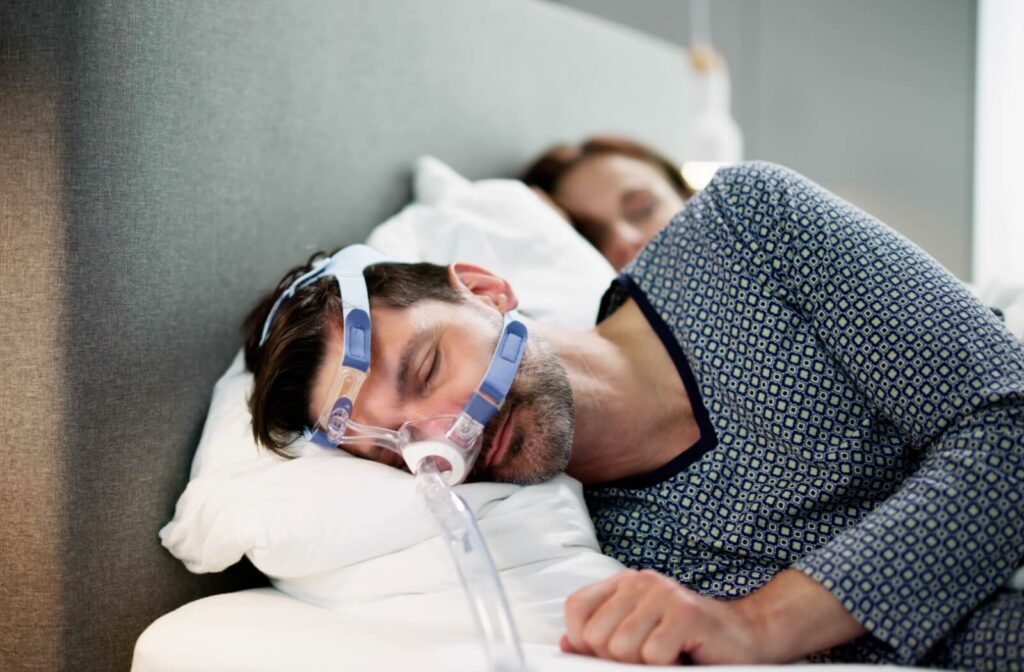Sleep apnea is a serious sleep disorder that affects breathing during rest—and in some cases, family history can increase your risk. Yes, sleep apnea can have a hereditary component, especially when combined with other factors like anatomy, weight, or lifestyle. If someone in your family has been diagnosed, it’s worth understanding how genetics may influence your own risk and what signs to watch for.
By exploring the connection between heredity and sleep apnea—as well as other contributing factors—you can take steps to better understand, manage, or even prevent its effects.
What is Sleep Apnea?
Sleep apnea is a sleep disorder characterized by repeated interruptions in breathing while sleeping. These interruptions, known as “apneas,” can last from 10 to 30 seconds or longer, disrupting your sleep and reducing oxygen levels in the blood.
There are three main types of sleep apnea:
Obstructive Sleep Apnea
This is the most common type of sleep apnea. OSA occurs when the airway is partially or completely blocked during sleep, often because the throat muscles or tongue relax too much.
Central Sleep Apnea
CSA is rarer and occurs when the brain doesn’t send the proper signals to the muscles that control breathing. Unlike OSA, CSA is not caused by an airway blockage.
Complex Sleep Apnea Syndrome (Mixed Sleep Apnea)
This type is a combination of OSA and CSA and can occur when OSA is treated but CSA symptoms persist. Without treatment, sleep apnea can have serious health consequences, including high blood pressure, heart attack, stroke, memory issues, and a higher risk of accidents due to daytime fatigue.
Is Sleep Apnea Hereditary?
The question of whether sleep apnea is hereditary is complex. While sleep apnea isn’t guaranteed to be passed down, research shows that family history can play a role. Here’s how genetics may influence your risk:
Facial & Airway Structures
Genetics can impact the shape and size of important features like your jaw, nose, throat, and airway. A narrowed airway or certain facial structures might make some people more prone to having obstructive sleep apnea.
Fat Distribution
The way fat is distributed in your body can also be influenced by genetics. For instance, individuals who store more fat around their neck or upper body may have a higher chance of developing OSA because these fat deposits can obstruct the airway during sleep.
Circadian Rhythm & Natural Sleep Patterns
Sleep-wake cycles and patterns are partially controlled by genes. Irregular sleep patterns or certain circadian rhythm disorders may increase your risk of developing sleep apnea.
Breathing Mechanics
Some hereditary factors may influence how efficiently you breathe while sleeping, including muscle tone during sleep which can impact the airway.

What About Central Sleep Apnea?
Unlike obstructive sleep apnea, central sleep apnea doesn’t appear to have a genetic link. It’s more often associated with underlying medical conditions, like heart failure or neurological disorders, or the use of certain medications.
If you have a close family member with obstructive sleep apnea, you may be at higher risk. While genetics alone don’t cause sleep apnea, they can increase susceptibility when combined with other factors like age, weight, and lifestyle.
What Are the Risk Factors for Sleep Apnea?
Sleep apnea risk factors depend on its type. Here’s an overview:
Risk Factors for Obstructive Sleep
- Large tonsils or adenoids: Particularly in children and young adults.
- Recessed chin or overbite: Certain jaw structures make airway obstruction more likely.
- Higher body weight: Excess weight, particularly around the neck, increases OSA risk.
- Larger neck circumference: Men with necks larger than 17 inches and women with necks larger than 16 inches are at greater risk.
- Family history: If you have relatives with OSA, your chances of developing it increase.
- Smoking or alcohol use: Smoking causes inflammation and fluid retention in the airway, while alcohol relaxes throat muscles.
Risk Factors for Central Sleep Apnea
- Certain medical conditions like heart failure, stroke, or kidney failure.
- Neurological disorders, such as Parkinson’s disease.
- Prolonged use of medications like opioids, benzodiazepines, or anticonvulsants.
Risk Factors for Complex Sleep Apnea Syndrome
- Use of CPAP (continuous positive airway pressure) therapy for treatment-resistant OSA.
- Issues with uncoordinated brain signals regarding breathing.
- High body weight and preexisting health conditions.
Managing Sleep Apnea
If you or a loved one is experiencing sleep apnea, don’t worry! There are ways to manage symptoms, improve sleep quality, and lower risks.
CPAP Machine
CPAP therapy is the most common and typically effective treatment for OSA. These devices deliver continuous airflow through a mask to help keep your airway open during sleep.
Oral Appliances
Dentists can prescribe oral devices, such as mandibular advancement devices (MADs) or tongue retaining devices, to position your jaw and tongue to prevent airway blockages.
Lifestyle Changes
- Weight loss: A reduction in weight can lead to significant improvements in OSA symptoms.
- Sleep on your side: Sleeping on your back can increase the chances of airway obstruction.
- Follow a consistent sleep schedule: Better sleep hygiene can improve overall sleep quality.
- Avoid smoking and alcohol: Both exacerbate sleep apnea symptoms.
Surgical Options
In severe cases, surgery to remove excess tissue or correct anatomical issues may be recommended.
Improve Your Sleep Today
If sleep apnea runs in your family or you’re noticing symptoms like snoring, fatigue, or teeth grinding, it’s important to take action early. At Bloom Orthodontics, we offer custom oral appliance therapy and support to help manage sleep apnea comfortably and effectively. Contact us today to schedule a consultation and take the first step toward better sleep and better health.



